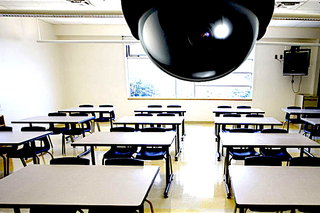
Delhi, Constant Surveillance of Kids at School Is Not a Good Idea
We’re used to shaking our heads at ineffective knee-jerk reactions, but this one seems worthy of a little outrage: the Delhi government plans to install continuous CCTV camera monitoring in classrooms across all sc...

We’re used to shaking our heads at ineffective knee-jerk reactions, but this one seems worthy of a little outrage: the Delhi government plans to install continuous CCTV camera monitoring in classrooms across all schools in the state, and make the feed available to parents 24/7 via an app.
The Delhi government is under pressure to answer parents’ questions about child safety after the recent murder of a young boy by another student, and rape of a young girl by school staff on school grounds. Parents are, understandably, angry, scared, and desperate. And this seems, perhaps, like a reasonable response from the state government: if we haven’t been able to protect your kids ourselves, maybe you can do it from your phone!
By at least one account, parents’ reactions to the plan have been fairly positive. Some parents have commented that it will allow them to monitor the teachers’ effectiveness (in addition to their child’s safety, of course). One parent even thought the CCTV feed would be particularly helpful for ensuring the school lunches were served on time. Bonus!
But here’s why this plan is an alarmingly bad idea (besides the fact that it almost brings to life the plot of a recent, disturbing episode of the dystopic Black Mirror).
First, it won’t make kids any safer.
There is no evidence that taping things makes people not commit crimes. Major cities all over the world are known to be under constant camera surveillance, and that certainly does not prevent the occurrence of violent crimes on city streets. Also, if the cameras are installed in classrooms, presumably there are many areas of school grounds that would not be covered; it would not take someone planning a crime long to figure out which corners of the building (or even specific classrooms) don’t fall within the watchful gaze of the camera’s angle. And no parent — hopefully — is actually going to spend the whole day watching real-time footage of a school day. (If they are, why not just go sit in school all day, every day, then?) Intermittent monitoring of a classroom camera is not going to stop crimes from happening on school grounds, if a perpetrator is intent on committing them.
Second, this is a serious infringement on children’s right to privacy.
Debates are raging across the world about whether children have a right to privacy, how far it extends, and whether parents can waive it on their behalf. Without getting into the intricacies of those arguments, it’s sufficient to say that most people are not comfortable with a government continuously monitoring its citizens as they go about their daily lives, and broadcasting footage of them to others. It doesn’t matter that in this instance, the citizens are children, and that the intent is to protect them; the fact that they’re children makes their rights even more vulnerable and should warrant additional consideration before infringing on them. Ironically, making a continuous feed of children available online may actually open them up to more danger — to online predators, who would now have a very convenient window to track them. (Let’s not pretend this app wouldn’t be easily hackable.)
Third, it’s a waste of valuable and limited resources.
This plan will be expensive. There are over 10,000 schools in the state, and each one will have many classrooms to cover. Between the hardware and installation, the development of the app, and the constant security monitoring of the feed, this is going to drain the Delhi school system’s coffers. You know what might be more effective? Spending that money on more careful background screening of school employees. Or setting up effective counseling and mental health support within schools, for victims of bullying or for kids who are feeling extensive academic pressure. Any number of measures that address the shortcomings of the school system’s safety and well-being protections would be better at preventing future crimes than a bunch of cameras.
This is a scary and difficult time for Delhi parents, but cameras in schools are not the answer. Violent, tragic crimes sometimes happen to innocent children. And as terrifying as that is, the most effective response is one that addresses the underlying, systemic issues that left victims exposed. It’s not, unfortunately, to turn schools into reality TV sets.
Related


The New Secret to Stress Relief: Eau de Partner
